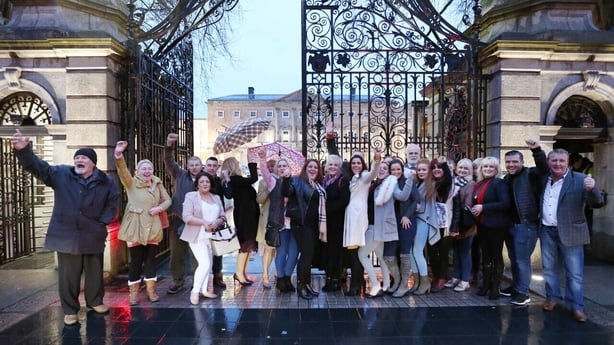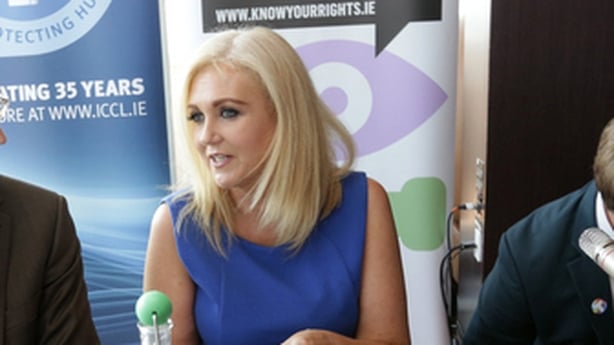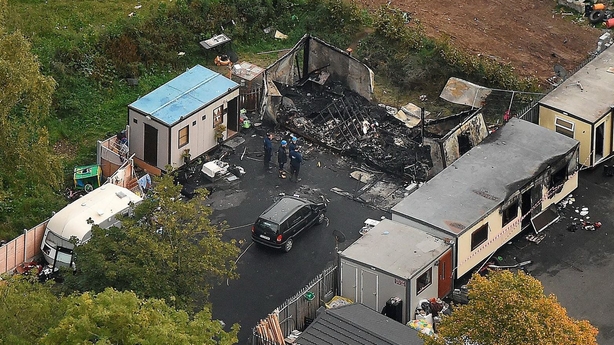The year before the Irish Traveller Movement was founded 30 years ago, there were 3,066 Traveller families in Ireland.
There were 854 of them living on the roadside, 1,653 were in housing and 559 lived on permanent halting sites.
The most recent figures show there were more than 11,000 Traveller families living in Ireland in 2018.
The figures show 591 were on the roadside, 3,941 in housing and 1,045 families on permanent halting sites, with 5,445 families living across other accommodation types.
More than 2,000 families live in inadequate, and unsafe conditions, many without access to running water or a toilet.
Almost 1,000 families live in overcrowded or shared housing.
Over the last 30 years, the Irish Traveller Movement has fought for the rights of many families and continues to be a voice for the community.
Today it celebrates its 30th anniversary.
Established in 1990, it began as a civil rights platform, inspired by Travellers who opposed the settlement policies imposed by the Irish State.
The Traveller Community experienced wide spread discrimination, segregation in schools and the 'bouldering' or blocking off of traditional camping spots.
This resulted in "a push" into urban areas in larger numbers.
Without positive and proactive Government policy, the Traveller community was subjected to constant evictions.
As a result, their movements were limited; creating a forced assimilation. It resulted in hostility from public authorities according to the ITM.
Recognition of Travellers' ethnic minority status was a founding principle of the Irish Traveller Movement.
Efforts to build solidarity between Travellers and Non-Travellers is what set it apart.

The ITM sought to shape a grassroots community membership to promote Traveller leadership and ensure that the voices of those in the Community were at the forefront of all discussions.
Six coordinators have overseen the running of the ITM to date.
Fintan Farrell was the first appointee in 1995.
The Irish Traveller Movement, according to Mr Farrell, emerged from a vocal group of Travellers who demanded more respect for Traveller history and way of life.
They rejected the general held belief that Travellers descended from people who were put off their lands in Famine times and needed to be assisted to 're-settle'.
He says this was a "misplaced belief" that informed public policy towards Travellers at the time.
There was also a new approach to working with people and communities experiencing oppression and exclusion based on community development inspired by practices originating in Africa, the Philippines and South America at the time.
Mr Farrell views the inclusion of the Traveller Community in the Programme for Government in 1993, culminating in the Report of the Task Force on the Travelling Community in 1995, as a milestone.
The current coordinator Bernard Joyce who joined the ITM at the age of 17, the year after it was founded, has also witnessed a number of milestones.
Looking back, he says he is haunted by the dark legacy of the State’s neglect and institutionalised racism towards the Traveller community.
"I attended an all Traveller school, where the expectations of me by others were so low, that reading was seen as an achievement. But on the first day, I disproved that bias and was moved into a class with final year students," said Mr Joyce.

He says there was not any standardised education curriculum, which meant there was no possibility of him doing the Leaving Certificate.
He left school with no qualifications, but later returned to education and graduated from the National University of Maynooth.
Mr Joyce says the Traveller Movement gave him the opportunity to challenge racism through a community development and human rights framework.
"A milestone moment for me was seeing within my lifetime State recognition of our ethnicity (2017), this was an incredible achievement and built over many years within the movement. We have much more to do," he said.
Dr Brigid Quilligan was coordinator from 2012 to 2015.
She joined the Irish Traveller Movement as a membership worker. She remembers a dynamic mix of Traveller women working in all parts of the country.
"We had good role model before us in Catherine Joyce (2000-2006 coordinator). When we challenged State agencies, I believe they got used to us and we forged good relationships with them on our terms," said Dr Quilligan.
However, Dr Quilligan says there was resistance around Traveller accommodation and lack of outcomes in education and health.
"Employment was stonewalled to a degree because of the institutional racism and lack of recognition of our people as an Indigenous Ethnic minority," she said.
She describes the solidarity, unity and common purpose that was fostered between Traveller organisations, especially in the aftermath of the fire at Carrickmines, as "remarkable".
"When we protested at a Government Traveller accommodation monitoring conference after ten of our people had died, we were criticised for taking that action by the State appointed principles.

"Travellers across the country felt we had heard them, but the State felt we crossed the line. It is one of my proudest moments. Nobody should ever thank and bow to their oppressor," she said.
She also views the re-emergence of the discussion on nomadism, horses, culture, language as an achievement.
The Irish Traveller Movement is still driven by the community through a network of local representative groups working for transformative change in the areas of Traveller Accommodation, Ethnicity, Political representation, Education, Youth and Equality.
Its achievements are vast.
It has established programmes and initiatives such as the Yellow Flag Schools diversity initiative, Cena; the only Traveller Voluntary Accommodation Association, the ITM Independent Law Centre and the Equality and Advocacy Programme which drove State recognition of Traveller ethnicity in 2017.
To celebrate its 30-year anniversary, the six ITM co-ordinators will join the Minister for Children, Disability, Equality, Integration and Youth Roderic O’Gorman for a live streamed Facebook panel discussion this afternoon, which will be chaired by RTE’s Miriam O’Callaghan







